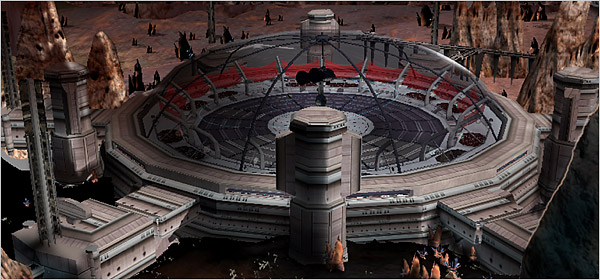
The New York Times
May 2, 2006, p. B1
"An Online Game's Economy Yields A.T.M. Dollars"
(online title:
"Entropia Universe Players Can Cash Their Online Earnings at the A.T.M.")
By SETH SCHIESEL

When you put your card into an automated teller machine, view your balance on the screen and then receive money from the dispenser, you probably understand that a merely electronic notion — your bank account — is being translated into a physical object with value: greenbacks.
But what if you are at the corner A.T.M. and your net worth is locked up in an imaginary asteroid mining venture?
Until now you would be plumb out of luck. But today the makers of Entropia Universe, a popular online science-fiction game, plan to introduce a real-world A.T.M. card that will allow players instantly to withdraw hard cash automatically converted from their virtual game treasury. So a player with, say, 2,000 spare P.E.D.'s (Project Entropia Dollars) left over after purchasing a new laser rifle in the game could withdraw $200 and take a date to a real-life ballgame.
With around 250,000 players, Entropia is the leader of a small but growing group of online computer games with virtual economies explicitly based on real-world money, and today's announcement is the most ambitious step yet to meld an in-game economy with the real global financial system.
The game's maker, MindArk, based in Gothenburg, Sweden, estimates that Entropia players generated $165 million (or 1.65 billion P.E.D.'s) in total economic activity last year. Since the game's inception in 2003, it has been relatively simple for players to add money to their Entropia accounts via credit card or electronic bank transfer. But until now withdrawing money from the system was a cumbersome affair that could take months, as MindArk employees manually verified that the player's virtual fortune had been earned legitimately (and not by hacking).
"We want this game to be a full second reality," Jan Welter, MindArk's chief executive, said in a telephone interview. "We want you to be able to have fun, make friends, make a business, enjoy music and art and do it in our game. The A.T.M. card is a big step toward bringing people into our world because they can have comfort that they can access their virtual funds immediately."
In most mainstream online games, like the spectacularly popular World of Warcraft, spending real money for virtual items is not only against the rules but also considered the worst sort of louche behavior, like paying for sex. But in Entropia, the entire game system is based on the fact that 10 P.E.D.'s equal a dollar and that the game's virtual items and assets have real-world value.
For instance Jon Jacobs, known online as Neverdie, a 39-year-old Entropia player in Miami Beach, last year sold almost everything he owned (real and virtual) to scratch together $100,000 (1 million P.E.D.'s) to buy a huge space station in the game. By selling apartments and storefronts to other players and by imposing taxes on players' hunting and mining on his real estate, he is now making about $12,000 a month on his investment, he estimates. And his big nightclub is still under construction.
"The A.T.M. card is a huge step forward because it's all about making the experience more immersive, and now that we know we have easy access to our money, it's going to give people even more confidence in the system," Mr. Jacobs said. "Among the higher echelon of players we're moving money around big time. Like when I'm upgrading my resort, and I want to buy a new creature for people to hunt, we're talking about $1,500 or $5,000.
"People are spending $10,000 for land that's not even prime property. Now people are hunting in my resort, and I can take money out and go buy a real dinner. That's fantastic."
Mr. Welter said that MindArk software engineers had been working on the A.T.M. project for years, and that they had finally developed a system secure enough to allow instant verification and cash authorization. He said his company was in contact with the Swedish government, and that systems were in place to prevent money laundering and other potential abuses.
"We have ways of detecting abnormal fluctuations between players and so on, and if this would happen, we would know about it," Mr. Welter said.
He said that MindArk had never been asked about the game by the Internal Revenue Service or United States law-enforcement agencies.